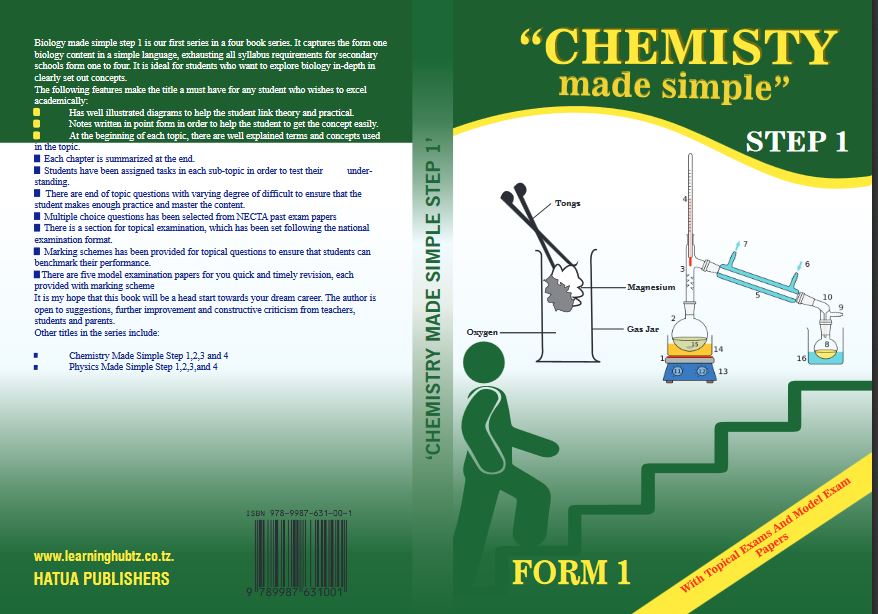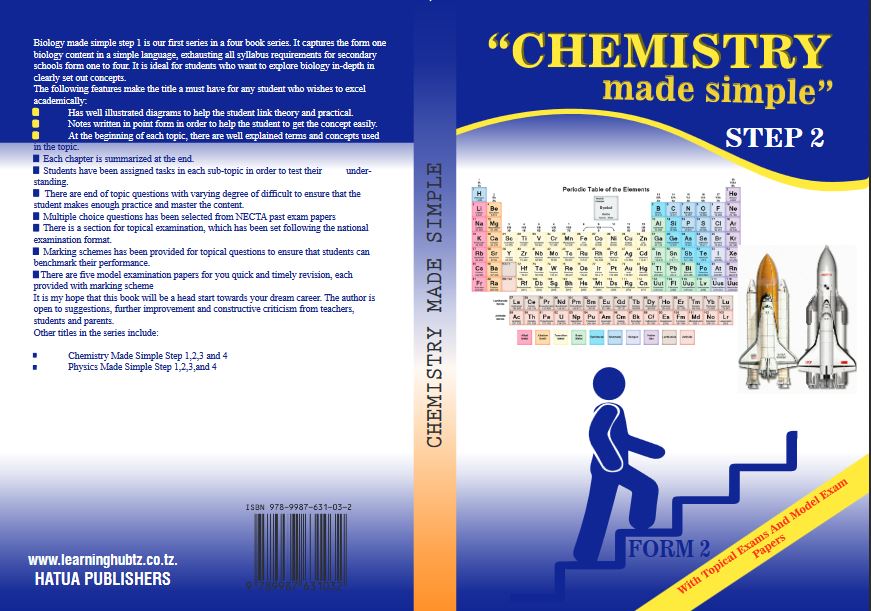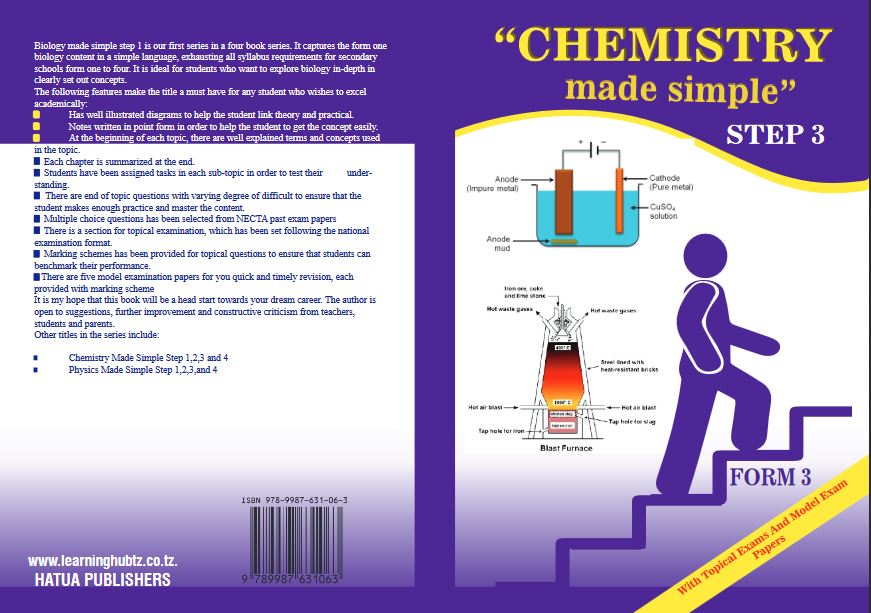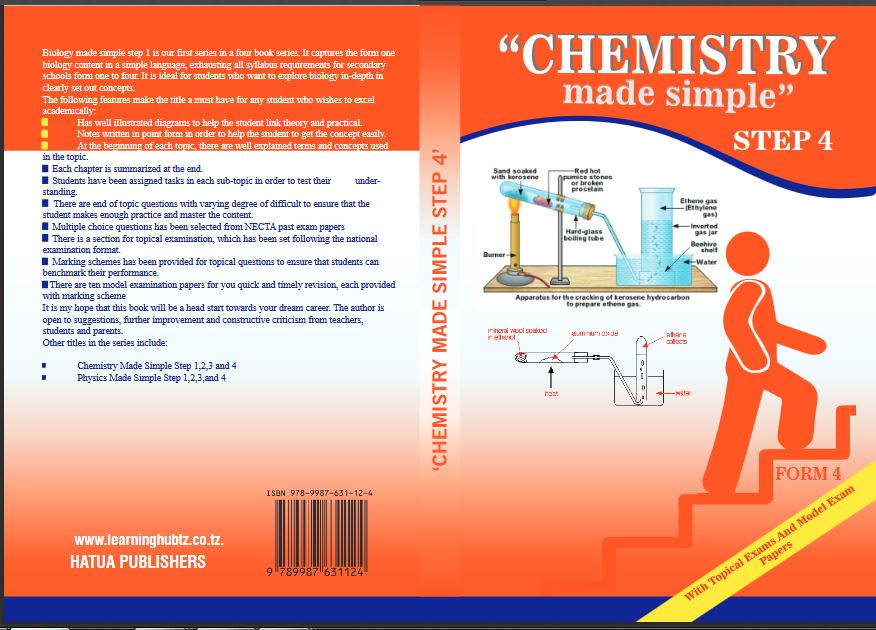THE UNITED REPUBLIC OF TANZANIA NATIONAL EXAMINATIONS COUNCIL OF TANZANIA CERTIFICATE OF SECONDARY EDUCATION EXAMINATION
ENGLISH
(For Both School and Private Candidates)
Time: 3 Hours Year: 2007
SECTION A
COMPREHENSION
1. Read the passage below carefully and answer the questions that follow.
Typical of the African Savannah is a scene which shows signs of the wet and dry seasons. In the dry season, the deciduous trees slowly lose their leaves, the grasses turn yellow and dry up, rivers diminish in size and sometimes disappear entirely, and the landscape assumes a dusty, yellow-brown appearance. The few trees scattered among the grass are specially adapted to withstand the heat and aridity of the dry season. They shed their leaves to avoid excessive transpiration. They also have long roots and sometimes, as in the case of the huge baobab tree, they store moisture in their trunks. In the dry Savannah the stunted bushes have very thin leaves and thorns which reduce transpiration to a minimum. Indeed, in the very dry seasons, the landscape resembles more open thorn forest than the conventional picture of the Savannah.
The tall, unusually coarse Savannah grasses grow in bunches or tufts separated by patches of bare soil. Their stalks are stiff and harsh and in the dry season they burn readily. Since they do not provide natural hay the wild herbivorous animals such as giraffes and zebras in East Africa rely on the tender new shoots along the river banks or the lake shores. The regular movement of animals, together with the carnivores such as the lion and leopard which follow them, is accompanied by the dry season big sport of hunting nowadays with the camera as well as rifle.
The temperature reaches its highest levels just before the onset of the rains. These rains, particularly in West Africa preceded by wind storms in which strong convection currents set up the heat, whirl about the dust in a most unpleasant manner. A soon as the moist air stream has sufficiently penetrated the hot and dry areas, the dust storms turn into torrential rainstorms with violent thunder and lightning. Indeed, much of the rainfall in the wet season falls in a series of quite widely separated convectional storms, so that it is wrong to think of the wet season as a time of almost continuous rain.
The onset of the rains causes a marked and sudden change in the whole landscape. The rivers become swollen and sometimes flood. The dry brown earth becomes clothed with a green sheen of new grass. Water-conserving bulbs throw up shoots and the trees burst into leaf. The grass grows at an astonishing rate and varies in height from four to 12 feet according to the rainfall and location. But the heavy convectional rain, despite its obvious value, brings with it the problem of soil erosion. This danger has been increased by the over-cutting of the wooded areas for fuel and by poor farming methods which ruin the fertility of the soil. The result is that in many parts of the Savannah the people can only scrape a bare living out of the land. The people's progress is made more difficult by the occasional ravages of locusts which destroy evergreen shoots in their path, and also by the disease spread to cattle by the tse-tse fly.
QUESTIONS
1. For each of the items (i) — (x), choose the correct answer from among the given alternatives and write its letter beside the item number in the answer booklet provided.
(i) Among the 4 statements below, which one is not correct? In the dry seasons it is true to say:
- all the trees lose their leaves.
- grasses dry up.
- rivers are reduced in size.
- some rivers disappear.
- the stunted bushes have very green leaves.
(ii) Which of the following methods is not used by trees to adapt them in the dry season?
- Shedding their leaves to avoid excessive transpiration.
- having very long roots.
- having thin leaves and thorns.
- assuming a dusty yellow-brown appearance.
- having large green leaves.
(iii) Animals tend to move to river banks in the dry seasons because:
- the carnivores will not follow them there.
- they are now only hunted with the camera.
- the Savannah grasses burn readily.
- the Savannah grasses do not make good hay and there are tender shoots there.
- they are escaping from the dust storms.
(iv) What precedes the arrival of the rains?
- torrential rain storms.
- widely separated convectional storms.
- high temperature and wind storms.
- dust-storms and torrential rain.
- low temperature and wind storms.
(v) In the fourth paragraph the writer is:
- drawing a vivid contrast between the dry season and the effect of the rains.
- describing the swollen rivers and the new growth of grasses.
- describing the effect of the rains on the grasses and trees.
- marveling at the rate of growth of the grass, because it may grow up to 12 feet in height.
- describing poor farming methods.
(vi) One of the effects of soil erosion on the people is that it:
- makes them to practice in poor farming methods.
- makes them to over-cut woodlands.
- prevents them from producing much crops.
- discourages them from digging much crops.
- brings and spreads diseases.
(vii)In the first paragraph the writer is:
- describing an unusual scene in the Savannah.
- contrasting the situation with other vegetation areas.
- describing the sort of scene that can be expected in the Savannah lands.
- trying to show that there is no one place that can be called typical Savannah.
- explaining the characteristics of wet season in the savannah.
(viii)What point is the writer trying to make at the end of paragraph three?
- rains follow the long dry season
- rain is caused by convectional currents
- it does not rain continually in the wet season
- trying to show that there is no one place that can be called typical Savannah.
- explaining the characteristics of wet season in the savannah.
(ix)What happens before the onset of the rains?
- there is a marked and sudden change in the whole landscape.
- the hunt of wild game is confined to the river banks of the lake shores.
- the rivers become swollen and sometimes flood.
- the trees burst into leaves.
- the temperature reaches its high levels.
(x) On the whole, the passage describes:
- the contrasts of the dry and wet seasons in the African Savannah.
- the harsh climate of the African Savannah and its effect on plants and wild game.
- the harsh climate of the African Savannah despite its capricious weather.
- soil erosion and the spread of cattle disease by tsetse fly in the African Savannah.
- problems of soil erosion caused by poor farming methods.
2.Read and summarize the following passage. Use about 40 words.
Tuesday is a lucky day according to the Talmud, books of Jewish teachings. In fact, the old folk rhyme declares, "Tuesday child is full of grace". Grace, in this case, means special blessings from heaven. Tuesday is also the day of Mardi Gras, the carnival of singing, dancing and merrymaking before the fasting and prayers of the Christian Lent. Other groups of people think Tuesday is unlucky. The Hindus avoid doing business or starting a long journey on a Tuesday. In Greece and Albania, Tuesday is considered a bad day for any important event to take place.
View AnsSECTION B
LANGUAGE
3.Match the items in List A with words in List B to produce complete meaningful sentences and write the letter of the corresponding words beside the item number in the answer booklet(s) provided.
LIST A
(i) John kept looking at the girl
(ii) He tried harder and harder
(iii) He did not go to school
(iv) She will write to you
(v) The more you read
LIST B
- although his father was highly educated.
- he was unable to walk.
- he sold the house.
- even if you buy a new dress.
- wondering where he saw her before.
- the better your English will become.
- to get married now.
- unless you write to her.
- she managed to do the exercise.
- but achieved less and less.
4.Rearrange the following five sentences into a logical sequence to make a meaningful paragraph by writing the corresponding letters in the answer booklet(s) provided.
(a) Several years earlier a man had built a locomotive, but it was meant to travel on the road, not on rails.
(b) George Stephenson realized that a railway track was necessary.
(c) Hundreds of people went to watch the train on its first journey.
(d) George Stephenson was the real father of the railway engine and the railway.
(e) He built his first line in the North of England, and it was opened in 1825.
View Ans5.Choose TWO (2) topics out of the given four and write a composition according to instructions given.
(a) Write a letter to your pen pal Sawak describing to him/her about mount Kilimanjaro as the highest mountain in Africa. Talk about its peaks, beauty and its attraction to people from outside Tanzania. The aim of your letter should be to attract your pen pal to come and see the mountain. Use the following name and address: Dotto Masanja, P. O. Box 15, Mwanza.
(b) Old is gold'. Discuss giving examples from your own experience (250 words).
(c) Imagine that you have been given as a reward for good performance in academics. Give a full description of how you would spend the money (250 words).
(d) Bush fires cause a lot of damage to environment. Your village has invited you to educate them on bushfires. Write a speech which you are going to deliver.
View AnsSECTION C
STRUCTURE
6.Choose the correct word from the list (A — J) to fill in the blanks (i) - (iv) in the given paragraph. Write the letter of the correct answer beside the item number in the answer booklet provided.
| A. of; B. with; C. for; D. in; E. by; F. on; G. beside; H. next; I. beyond; J. under |
Mr. Mjema has discovered that a spider has made a cobweb (i) ......... his room. He wants to kill the spider (ii) ......... poison from a spray bottle. He approaches the spider very carefully and presses the lid (iii) ......... the bottle. But as he is holding the spray bottle the wrong way round, he gets a shower on his face. He collapses and falls down (iv) ......... the floor where he lies fast asleep for hours.
View Ans7.Choose the correct answer from among the given alternative to make a meaningful sentence and write its letter beside the item number.
(i)She will never succeed hard she tries.
- unless
- even if
- however
- nevertheless
- if
(ii) What time did they . . . . . . . the village?
- arrive
- reach at
- return
- reach
- returned
(iii)When Musa opened the door he . ........ a dead body.
- See
- saw
- has seen
- is seeing
- had seen
(iv)If you had warned Malongo, he . . . . . . on time but he was late.
- would came
- would have come
- will have come
- had come
- will come
8. Choose the letter of a correct expression that can be used to complete each sentence. Write its letter beside the item number in the answer booklet provided.
(i) The father was neither brilliant his son.
- is
- was
- does
- nor
- or
(ii) Everybody in the school ......... to win the prize.
- wants
- want
- is wanting
- are wanted
- are wanting
(iii) I guessed that he wouldn't return until he ......... all his money.
- has spent
- have spent
- has spent
- would have spent E. spent
(iv) The horrid girl ......... her book.
- denied to lend me
- refused to lend me
- refused to borrow me
- refused me to lend
- refused to
9.Choose the correct expression that can be used to complete the given sentences. Write its letter beside the item number in the answer booklet provided.
(i) Watching a film was than watching a play.
- very much better
- much better
- very more better
- very much more better
- most better
(ii) Each of them has brought . . . . . . .. fiancé at home.
- his
- their
- her
- one's
- himself
(iii)The house ......... Juma lived belongs to his uncle.
- that
- which
- whose
- in which
- at which
(iv) Where is Mr. . . . . . . . wife staying?
- Jame's
- James'
- James's
- James
- Jame
10.In items (i — iv) fill in the missing word to each of the given sentences by writing the letter of the missing word beside the item number in the answer booklet provided.
(i) They left by bus, so ......... the tourists.
- did
- were
- the same
- as
- like
(ii) Thomas ought not to ......... me your secret, but he did.
- tell
- were
- be telling
- have told
- told
(iii) For how long are you going to be here? About an hour. I hope you ......... mind waiting for so long.
- don't
- wouldn't
- shouldn't
- didn't
- won't
(iv) You ..... .. write, but please phone.
- oughtn't
- shouldn't
- needn't
- wouldn't
- couldn't
SECTION D
RESPONSE TO READING
NOVELS AND SHORT STORIES
1.Madam, this is Annie - Diane Case (1986) Macmillan
2.A Wreath for Father Mayer of Masasi - by Ndunguru S.N (1997) - Mkukl na Nyota
3.Encounter from Africa - by Macmillan Education Limited (2000)
Plus any three (3) of the following:
- Is it Possible? - Kulet H. R. Ole (1975) - Longman.
- The Great Ponds - by Amadi E (1976) — Heinemann
- The African Short Stories - Neville Denny (ed) (1965) — (PASS) Thomas Nelson and Sons Ltd.
- Things Fall Apart — Chinua Achebe (1962) — Heinemann
- Mine Boy by P. Abrahams (1963) - Heinemann
- No Bride Price - R. David (19670) - EAPH Bride
- House Boy - by Oyono F. (1966) — Heinemann
PLAYS
1. Betrayal in the City - Francis Imbuga (1990 - Heinemann, Kenya
2. Lwanda Magere - Okot Omtatah (1991) — Heinemann, Kenya
3. Three Suitors one Husband — Mbia Oyono (1994) Eyre Methuen
4. The Lion and the Jewel - Soyinka O. (1963) — OUP
5. This Time Tomorrow — Ngugi wa Thiong'o (1972) - Heinemann
6. The Black Hermit- Ngugi wa Thiong'o (1968) — Heinemann
POETRY
1.Songs of Lawino or Ocol - Okot p'Bitek (1979)-EAPH
2.Plus five (5) Poems from either
- Growing up with Poetry - David Rubadiri (ed) (1989) - Heinemann Poems from East Africa - David Cook (1971) - EAPH Or
- Summons - Mabala (1960) - TPH
- Drum Beat- Okola Bennard (1967) - EAPH
11.The old generation has a duty to pass on its knowledge and experience to the young generation. How true is this in the two readings that you have done?
View Ans12.Europeans could not have succeeded in imposing and maintaining their colonial rule without the support of some Africans. What examples of this can you find in two of the readings you have done and why do you think these Africans supported the Europeans?
View Ans13. Story telling plays an important role in the life of every society. Give evidence from two readings you have done.
View Ans14.A lot of misunderstandings in several African societies resulted from the introduction of new ideas brought about by formal education. Discuss this statement with reference to two readings you have done.
View AnsANSWER

Hub App
 For Call,Sms&WhatsApp: 255769929722 / 255754805256
For Call,Sms&WhatsApp: 255769929722 / 255754805256
 For Call,Sms&WhatsApp: 255769929722 / 255754805256
For Call,Sms&WhatsApp: 255769929722 / 255754805256
WHATSAPP US NOW FOR ANY QUERY
App Ya Learning Hub Tanzania





